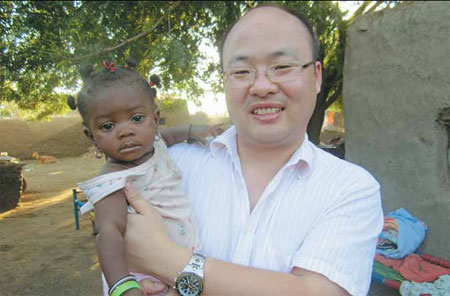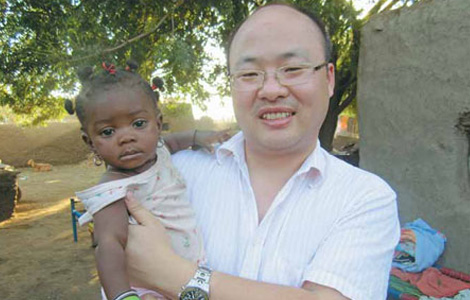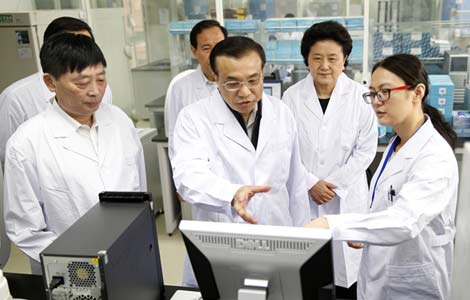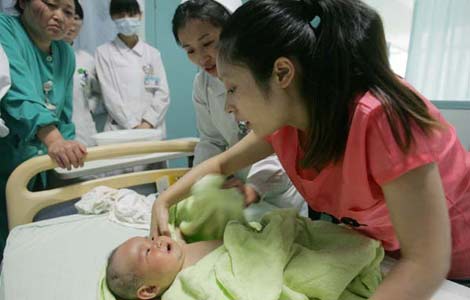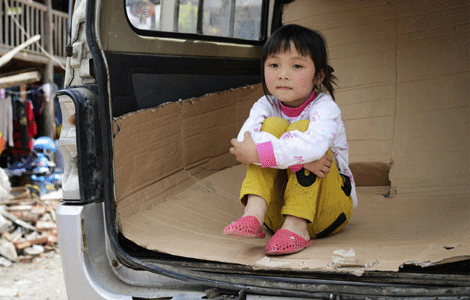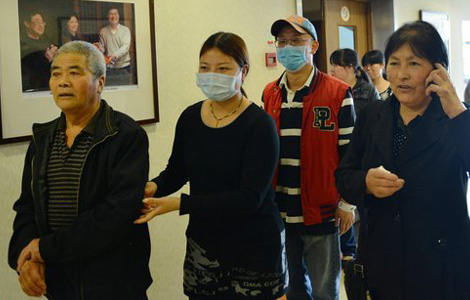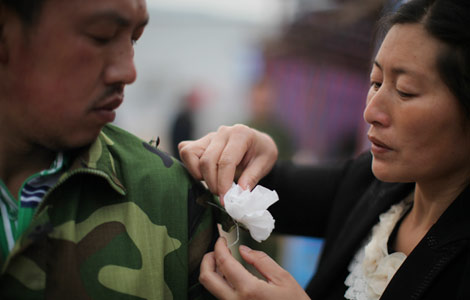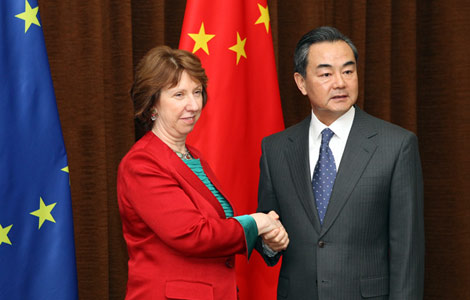Chinese NGOs reach out to African countries
Updated: 2013-04-29 07:53
By Meng Jing and Sun Yuanqing (China Daily)
|
||||||||
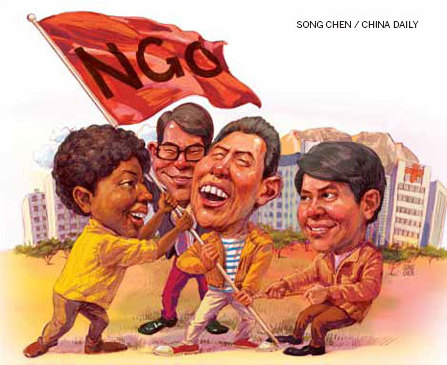
|
Wu Peng from the China Foundation for Poverty Alleviation visits Sudan to learn about the country's living conditions for mothers and babies. Provided to China Daily |
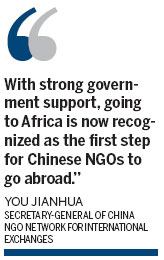
Groups give new impetus and direction for people-to-people exchanges in Africa with their community outreach programs, report Meng Jing and Sun Yuanqing.
At almost the same time that President Xi Jinping announced during his recent visit to Africa that China will extend a $20 billion credit line to the continent over the next two years, Zhang Ming, a director of the Red Cross Society of China, was busy raising funds of more than 30 million yuan ($4.85 million) from China to build public health centers in Africa, the first overseas project by her organization.
Though the project may not seem as generous as the $20 billion credit line from the Chinese government, it is a giant leap for China's non-governmental organizations. Giving back to society with an enlightened self-interest is the common tag line used to identify NGOs globally. But with more than half of the nation's people living in poverty before the 1990s, Chinese NGOs were more likely to receive financial assistance from developed countries, rather than extending help.
"We have been receiving donations from other member nations of the International Committee of the Red Cross for quite some time. Though we did donate money to other countries for emergency disaster relief from time to time, we had never set up operations or run long-term projects outside China," said Zhang, director of the external liaison department of Red Cross China.
Her plan for the organization's first steps abroad include a three-year program covering Kenya, Tanzania and Uganda, setting up community-based centers that offer first aid, healthcare and water supplies.
With the rapid economic development of China and the country's transition from an "upper middle income" economy to a "high income" economy over the next 15 to 20 years, a small but growing group of NGOs are eager to go outside China and give a hand to less well-off countries. The friendly relationship and increasingly strong trade ties between China and Africa have made the continent an ideal destination for Chinese NGOs wanting to test the waters.
Financial help from the Chinese government has been a big factor in the growing number of Chinese NGOs that are keen on undertaking projects in Africa. According to experts on the ground, Chinese NGOs have not only made meaningful contributions in Africa, but also played an important role in promoting bilateral relations between China and Africa through people-to-people exchanges.
There are no official statistics about the number of Chinese NGOs operating in Africa, but Liu Hongwu, director of the Institute of African Studies at Zhejiang Normal University, estimated that there are more than 100 Chinese NGOs operating in Africa, and 10 of them have permanent operations and local offices in Africa.
Liu, who is also an expert in NGO studies, said that the number of Chinese NGOs operating in Africa has seen tremendous growth over the past four to five years.
Li Liqing, board member of the Chinese-African People's Friendship Association, said that the rapid economic development of China is one of the major reasons pushing these organizations into Africa.
For Red Cross China, the decision to go abroad came in 2011, when China officially overtook Japan as the world's second-largest economy.
According to Zhang, membership countries of the International Committee of the Red Cross are broadly divided into two categories. Donors such as countries in northern Europe are partnership national societies, while receivers, such as Nepal and China, are operational national societies.
"When China became the second-largest economy in the world, we knew that we could not be a receiver forever. We needed to step forward and offer our help to other countries," she said.
Strong government support is another major driver. President Xi Jinping has in his keynote address to the 2nd China-Africa People's Forum indicated that a new type of China-Africa strategic partnership is being promoted, in which cultural and people-to-people exchanges are the key.
Li from the friendship association said there is a growing emphasis from the Chinese government on people-to-people exchanges being the foundation for strong China-Africa ties.
"China-Africa cooperation is mainly on the government-to-government level. To further develop strong ties with Africa, it is important to make more African people know and understand China," Li said.
You Jianhua, secretary-general of China NGO Network for International Exchanges and the organizer of the People's Forum, said unlike many other countries, the relationship between the Chinese government and NGOs is friendly.
"With strong government support, going to Africa is now recognized as the first step for Chinese NGOs to go abroad," said You, who recently organized a team of Chinese NGOs to build water wells in Africa.
"We can tell the trend from the increasing number of NGOs who took part in China-Africa People's Forum," he said. The forum, held alongside the ministerial conference of FOCAC since 2012, attracted around 300 delegates from NGOs in China and Africa last year.
"Not all the NGOs in China are ready to go abroad, but I think the top ones, which have the ambition to grow themselves into international organizations, are ready to step onto foreign shores," said Tu Meng, secretary-general of China Youth Development Foundation.
He added that being international doesn't necessarily mean extending financial assistance to other countries but also means in having operational and long-term projects in these nations along with representative offices.
Since March 2011, nearly $3.5 million raised by WECBA has gone toward the construction of 17 schools in Tanzania, Kenya and Burundi. Thousands of African children in these low-income countries have benefited immensely from the project.
Yan Shi, deputy director of the department of Project Hope for Africa with CYDF, said the demand for help in Africa is quite strong.
"Many of the rural schools we visited in Africa are made of mud and animal dung. There is even one school in Kenya, which has no walls at all, and is just a blackboard under a tree with some stones on the ground for children to sit on," he said.
Yan, who worked for Project Hope China between 2008 and 2011, a program that has built around 17,900 schools in China since 1989, said in terms of help, the landscape in China and poor countries in Africa is quite different. "Project Hope in China has increasingly involved constructing schools to equipping schools with computers and other facilities, including training rural teachers, while the demand in Africa is still at the stage of school construction," Yan said.
Academics and insiders in NGOs said that China has progressed rapidly to something that is in between a developed economy and a developing economy, which means Chinese NGOs are in a better position to help, and the experiences they gather in their operation in China suit African situation better than their Western counterparts.
Karla Simon, a law professor at the Columbus School of Law, Catholic University of America, and an expert in civil society of China, said Chinese NGOs are closer in terms of their development to African NGOs, compared with Western NGOs.
"The civil society movement in China is really quite young. Nobody had heard of the term NGO until 1995 in China. But I think Chinese NGOs have a lot to bring to Africa as they are relatively recent," the Washington DC-based Simon said.
He Wen, director of project management center with the Amity Foundation, agreed, saying compared with NGOs from Western countries, it is easier for Chinese NGOs to fit their skills into African society because poverty alleviation is a much more recent event than in the West.
Since 2011, He's Nanjing-based foundation has trained dozens of people from Madagascar the skills of building biogas digesters and provided the country with 263 units of equipment for the building of biogas digesters in rural areas.
"A biogas digester, a practical equipment that turns organic waste into usable fuel, is very popular in rural China. We can take more useful technologies from rural China to meet demand in Africa. Western countries are quite developed and many of their skills may not fit into the African context quite well," he said.
However, every coin has two sides. The advantages can easily turn into disadvantages. Wu Peng, director of the International Development Department of the China Foundation for Poverty Alleviation, said that the young civil society in China can also means inexperienced NGOs.
"We haven't been engaged in international relations as long as Western NGOs. Western NGOs have been in Africa for 10 or 20 years. We don't have local contacts, we don't have enough talented people qualified to work overseas and we know nothing about running a project in Africa," Wu said.
Four years ago, China surpassed the United States as Africa's biggest trading partner. Bilateral trade between the two sides has grown from $10.6 billion in 2000 to around $220 billion last year.
More Chinese companies now consider Africa as an ideal investment destination, said a 2011 report from China Council for the Promotion of International Trade.
The report said that the number of Chinese companies investing in Africa has sharply risen and out of the $59 billion outbound direct investment that was invested abroad in 2010, 22 percent was invested in Africa. The strengthening business ties have prompted an increasing number of Chinese corporate donors, which are eager to give back to local communities after years of doing business in Africa.
Liu Hongwu, director of the Institute of African Studies at Zhejiang Normal University, said Chinese companies are the biggest financiers of charity projects in Africa.
Chinese businesses in Africa have enacted the role of NGOs, especially in terms of making a difference in local communities through their corporate social responsibility projects.
Hainan Airlines has been helping cure cataract patients in Africa since 2010, one year after the Shenzhen-based airliner opened its Beijing-Dubai-Luanda route.
The program called China-Africa Brightness Action is sponsored by Hainan Airlines and Anhui Foreign Economic Construction Group with help from doctors at the Beijing-based Tongren Hospital. The project, originally started in China's Qinghai-Tibet Plateau, where the strong sunlight results in millions of cataract patients, has cured more than 2,000 patients in Africa.
"When we entered Africa, we found that many African people suffered from cataract, which can be easily cured once you have doctors and medicines. So we decided to extend the project to Africa," said Li Xianhua, chief executive of Hainan Airlines. "We know we can't put money on top of our agenda; we also need to shoulder more responsibility and give back to local people."
According to Li, the company has invested 25 million yuan in the African project and the carrier would extend further assistance by sending a team of Chinese doctors to Africa in May.
Hainan Airlines is no exception. Huawei Technologies and ZTE Corporation, two high-tech giants in China, have also undertaken various corporate social responsibility projects in Africa.
Contact the writers at mengjing@chinadaily.com.cn and sunyuanqing@chinadaily.com.cn
(China Daily 04/29/2013 page3)
Most Viewed
Editor's Picks

|

|

|

|

|

|
Today's Top News
Chinese NGOs reach out to African countries
Abe defends shrine visits
Premier Li: 'High alert' to remain on bird flu
China to enhance ties with Argentina
Technology fair eyes innovation
'Wang-Koo meeting' anniversary marked in Taipei
China joins rush for Mars
A camper's life traveling the open road
US Weekly

|

|
